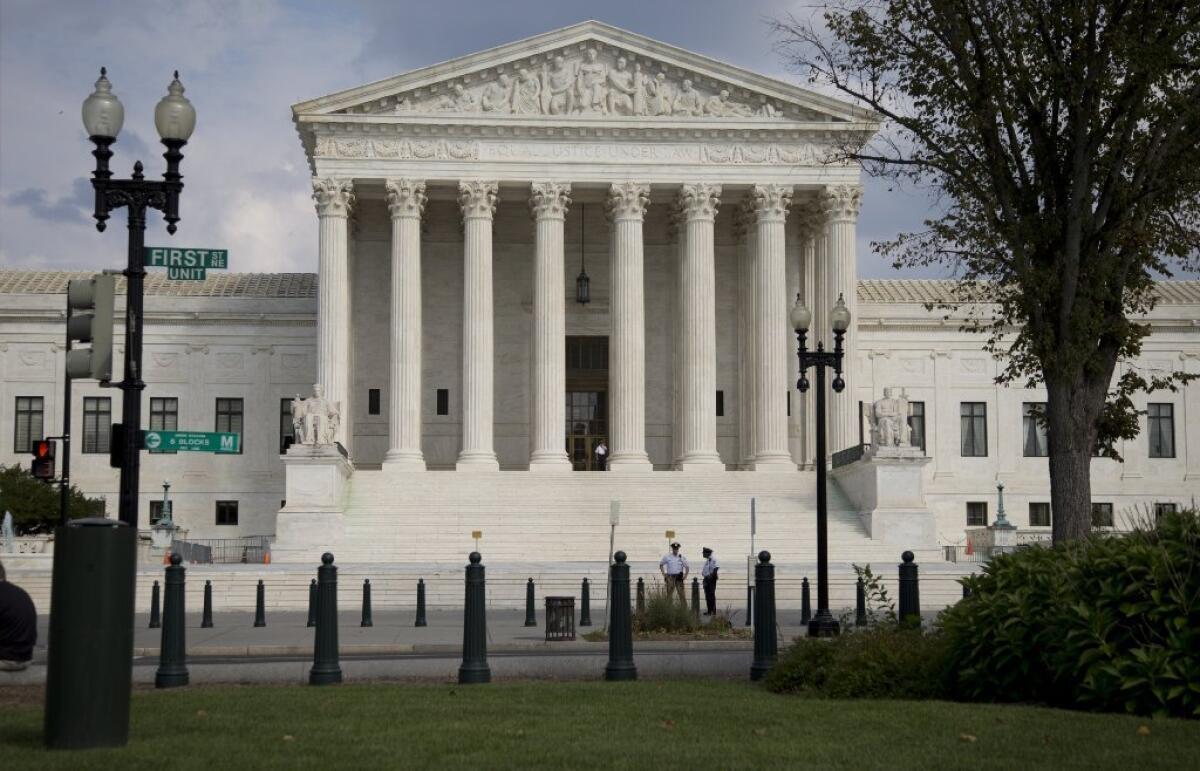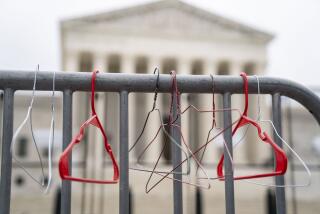Editorial: The complexities of keeping judicial candidates appearing impartial

On Tuesday, the Supreme Court will be asked to overturn a modest rule designed to minimize the reality and appearance of corruption in judicial elections, which increasingly are attracting the sort of special-interest money that gravitates to elections for other public offices.
------------
FOR THE RECORD:
Judicial elections: A Jan. 18 editorial said trial judges in California are elected. In practice, under the state’s hybrid system the vast majority of Superior Court judges are appointed by the governor. Voters elect judges only in those rare instances when the governor fails to fill a vacancy within the requisite period or when a challenger runs against a sitting judge at the conclusion of that judge’s six-year term.
------------
The court should decline the invitation. Instead, it should rule that it is not a violation of the 1st Amendment for states to prohibit judicial candidates from personally soliciting campaign contributions.
But the court’s task is complicated by a paradox. Men and women who seek election to political office — executive or legislative — are expected to make promises to their supporters. That’s the essence of democracy. But the only promise a judge should make is to interpret the law to the best of his or her ability without fear or favor.
The Constitution recognizes the latter reality by having the president appoint federal judges, subject to Senate confirmation. Nobody would suggest that their selection is totally free of politics, but potential federal judges are spared from addressing campaign rallies, forming political alliances, raising funds and kissing babies.
Appointment of state judges was also the rule in the earliest years of this country, but in the 19th century some states moved to making the position elective. Today, 39 states choose some or all of their judges in elections. (In California, trial court judges are elected, while appellate court judges are appointed by the governor and confirmed by a commission, and later face the voters in retention elections.)
Yet even as they have allowed candidates for judge to campaign, raise funds and spend money on advertising, many states have adopted regulations that treat judicial candidates differently from candidates for legislative and executive offices. Those rules recognize that the reputation of the judiciary for impartiality will suffer if judges are seen to be making (and keeping) campaign promises in the way the president, the senator and the local dog-catcher are.
Unfortunately, these efforts have faced challenges in the federal courts. For example, in 2002 the Supreme Court by a 5-4 vote struck down a Minnesota rule barring judicial candidates from announcing their views on “disputed legal or political issues” such as abortion, gun control and prayer in public schools.
Applying what the courts call “strict scrutiny,” Justice Antonin Scalia concluded that the prohibition violated the 1st Amendment. He noted that it “covers much more than promising to decide an issue a particular way.” (Never mind that many voters who hear a judicial candidate make, say, a strident anti-abortion speech will assume that the candidate will seek to translate his beliefs into law once the judicial robe is fitted.)
The 1st Amendment also figures in the case the court will hear Tuesday. In 2009, Lanell Williams-Yulee, a candidate for trial court judge in Hillsborough County, Fla., signed a mass-mail letter requesting campaign contributions. She was reprimanded by the state bar and the state Supreme Court for violating a canon of ethics saying that judicial candidates “shall not personally solicit campaign funds” and must delegate fund-raising to a committee. Twenty-nine other states (not including California) have similar prohibitions.
In challenging Florida’s rule, Williams-Yulee argues that it curtails her freedom of speech, but is not “narrowly tailored” to achieve a compelling interest in preventing corruption. She also notes that it is not a terribly effective law because judicial candidates are still able to learn who donated to their campaigns. If the goal is to prevent judges from rewarding contributors, she argues, a better way would be to force judges to recuse themselves from cases in which donors are parties.
Recusal is an important check on conflicts of interest, but it’s not the only one. And while it’s true that preventing a judge from personally soliciting contributions doesn’t keep her in the dark about who is funding her campaign, there is something especially egregious about a judicial candidate personally asking for money from people who might someday have a case before him or her.
Even if there is no quid pro quo, the very existence of that practice can corrode confidence in the impartiality of the judiciary. In a landmark 1976 case, the court said that the 1st Amendment is not violated by election laws that seek to prevent the “appearance of improper influence” over candidates. That’s a sensible position on the part of the court, yet a ruling for Williams-Yulee would weaken that principle, not just in cases involving judicial elections but also in cases involving other sorts of restrictions, including limits on contributions to candidates for Congress and the presidency.
Williams-Yulee complains that the rule is not narrowly tailored, but in fact, as the Florida Bar points out, “it places no restrictions on the ability of judicial candidates and their supporters to engage in free and robust expression,” and even the restriction on soliciting funds personally is only a minimal burden because the candidate’s committee is still permitted to raise money on the candidate’s behalf.
Ideally, states that elect their appellate court judges would move to an appointive system. It’s head-to-head elections for those courts that require candidates to mount expensive campaigns that attract special-interest contributions. In the meantime, those states should be able to insist that judicial candidates be more discreet and less political than other candidates. A judge is not just a politician in a black robe.
Follow the Opinion section on Twitter @latimesopinion
More to Read
A cure for the common opinion
Get thought-provoking perspectives with our weekly newsletter.
You may occasionally receive promotional content from the Los Angeles Times.






